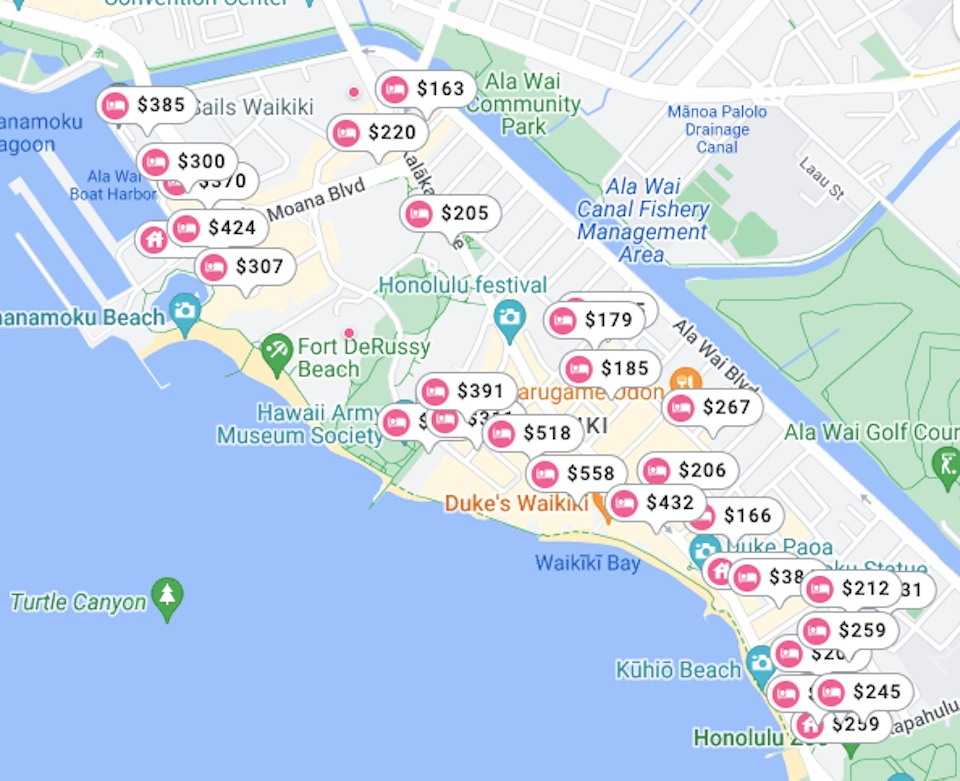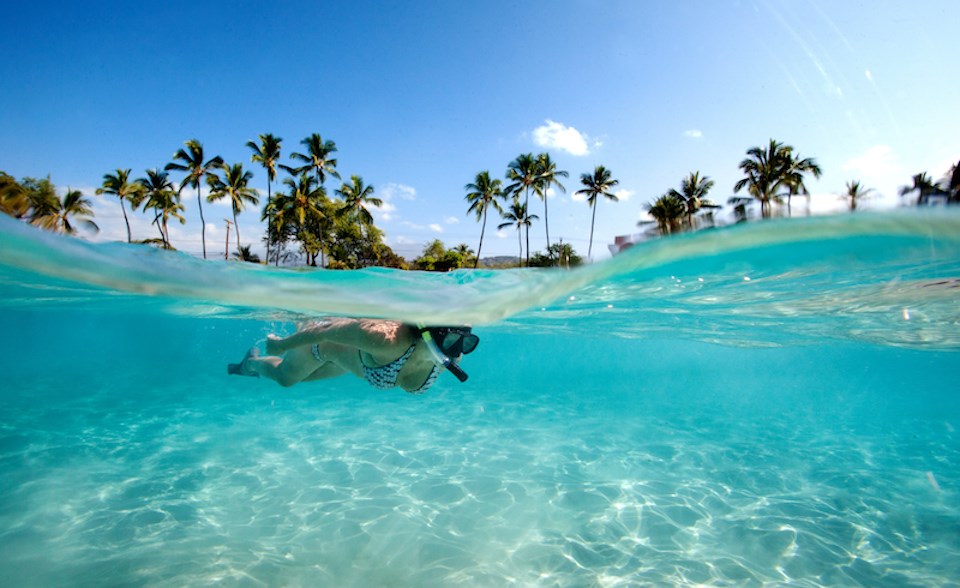Travel from Vancouver to Hawaii has picked up following the devastating wildfire in Maui -- but you might want to avoid visiting the areas that were impacted by the tragedy.
Claiming nearly 100 lives, the wildfire was the deadliest in United States history, destroying nearly every building in centuries-old Lahaina.
Maui re-opened to travel in November 2023 but officials caution against visiting areas that continue to struggle in the wake of the tragedy. However, travellers will find no shortage of places to visit across the rest of the state instead.
For example, Honolulu on Oahu is famous for its breathtaking, crescent-shaped beach and offers incredible nightlife, shopping and dining --- but it's only one of several islands to enjoy.
Here is everything you need to know to book a trip from Vancouver to Hawaii.
What airlines should I fly to to Hawaii?
Hawaii is located in the United States of America. All Canadians arriving by air in Hawaii must show a passport or Nexus card; they do not require a visa.
From Vancouver International Airport (YVR), travellers can fly to the following airports on the six islands:
- Daniel K. Inouye International Airport (HNL) in Oʻahu,
- Kahului Airport (OGG) in Maui
- Lihue Airport (LIH) in Kauai,
- Molokai Airport (MKK) in Molokaʻi,
- Lanai Airport (LNY) in Lānaʻi,
- Hilo International Airport (ITO) and Ellison Onizuka Kona International Airport (KOA) on the big island.
Airlines that fly to or partially to Hawaii via one of their airline partners include:
- Air Canada
- Alaska Airlines
- American Airlines
- Avianca
- Delta
- Emirates
- Hawaiian Airlines
- Qatar Airways
- United Airlines
- WestJet
When should I book my ticket to Hawaii?
Luckily, Hawaii is among one of the cheapest destinations for Metro Vancouverites. That means that tickets can be booked for a reasonable price nearly the whole year round.
But ticket prices do tend to fluctuate, with some carriers, such as Air Canada and WestJet, frequently dropping prices on trips to popular airports such as HNL and OGG.
Generally, you can get the lowest prices on tickets booked within one to three months of your departure date. If you plan on booking a ticket outside of this window, set a Google Alert for your travel dates in Google Flights. This will alert you when the price of your flight has dropped on the dates you would like to travel.
Ticket prices to Oahu, Maui, and Kauai often cost around $300 for a return trip with direct flights from Vancouver.
When is the best time of year to visit Hawaii?
The Aloha state enjoys warm weather all year round, making it an ideal destination to visit in terms of temperature. That said, it experiences hotter temperatures and less rain between March and September.
Thinking of spending the winter holidays on a Hawaiian island? Keep in mind that the rainiest month in the state is December.
Are hurricanes a threat to Hawaii?
Hurricanes occur from May to November in the eastern Pacific Ocean. However, unlike in the Caribbean, hurricanes don't tend to pose as significant of a threat to the Hawaiian Islands.
Powerful typhoons that form in the Pacific typically move west, affecting Australia and East Asia. Also, the odds of a storm hitting the small state are slim, meaning timing and conditions have to line up perfectly to result in a direct hit. Strong trade winds also tend to protect the islands from impact.
Hurricanes also require warm water to gain momentum and they tend to lose steam in colder, open ocean water before reaching the islands.
However, powerful tropical storms have wreaked havoc in Hawaii in the past, which means there is still a possibility that you'll need to change your travel plans abruptly.
Earthquakes in Hawaii: What you need to know
While hurricanes are rare, the islands experience mild earthquakes frequently. Most of these are minor and go unnoticed by people. However, some of them may be felt on one or more islands. There are roughly 11 quakes over 4.0 magnitude on the islands annually and one over 6.0 every decade or so.
Most earthquakes occur on Hawaii's largest island near the Kīlauea, Mauna Loa, and Kama‘ehuakanaloa (formerly Lō‘ihi Seamount) volcanoes and are caused by magma movements, accumulations, and eruptions, according to the Hawaiian Volcano Observatory.
If you’re in an area prone to earthquakes, familiarize yourself with emergency procedures.
Hawaii is prone to tsunamis and they can occur within minutes of a nearby earthquake. However, the risk of a tsunami can remain for several hours following the first tremor.
If you’re staying on the coast, familiarize yourself with the region’s evacuation plans in the event of a tsunami warning, including the Tsunami Evacuation Zones.
Are shark attacks common in Hawaii?
Shark attacks aren't common but they do happen. As of November, there have been six shark-related incidents in Hawaiian waters in 2023. These incidents range in severity, however, with the least extreme involving a bite to a surfboard to the most severe, where an eight to 10-foot tiger shark bit a surfer, resulting in the loss of a foot, according to the State of Hawaii's incident list.
The State of Hawaii offers several tips to reduce the risk of shark injury. Some of these may seem more obvious, such as avoiding places where sharks are "known to be present," while others may not cross your mind. For example, wearing contrasting clothing or shiny jewellery makes you easier prey for predators because they "see contrast very well."
Mother Nature aside, Hawaii has one of the lowest violent crime rates of any U.S. state, making it an ideal destination for tourists, particularly ones with children, according to the latest data from the Federal Bureau of Investigation.
Is the Diamond Head Crater worth visiting?
One of Hawaii's most popular attractions is the Diamond Head Crater located near the eastern edge of Waikiki’s coastline, which was formed about 300,000 years ago during a volcanic explosion.
Considered the state's most recognizable landmark, the stunning saucer-shaped crater offers sweeping coastal views and a historic hiking trail. The Diamond Head State Monument stretches over 475 acres and includes a 0.8-mile hike from the trailhead to the summit of Lē‘ahifrom, which is considered "steep and strenuous."
Once you reach the summit, you'll see "bunkers and a huge navigational lighthouse built in 1917. The postcard view of the shoreline from Koko Head to Wai‘anae is stunning, and during winter, may include passing humpback whales."
The unique profile of Diamond Head (Lē‘ahi) sits prominently near the eastern edge of Waikiki’s coastline. Hawaii’s most recognized landmark is known for its historic hiking trail, stunning coastal views, and military history. Diamond Head State Monument encompasses over 475 acres, including the interior and outer slopes of the crater.
What other activities can you enjoy in Hawaii?
Hawaii has some of the most beautiful beaches in the world, which are ideal places to kick back and get a sun tan. They also offer the ideal conditions for a wide variety of water sports, including surfing, snorkelling, boating, scuba diving, stand-up paddle boarding, kayaking, swimming, and more.
There are multiple parks spread across the islands and each of them offers a variety of places to enjoy hiking or gentle strolls. The Big Island has the most extensive network of hiking trails.
Other popular activities to enjoy include golfing, fishing, whale watching, swimming with dolphins, sightseeing, coffee and farm tours, and shopping.
How much money will I spend on accommodation?
While your ticket to Hawaii likely won't break the bank, some of the accommodations on the islands come with a staggering price tag. That said, there are affordable options for travellers who don't need luxury or who are a little more flexible with their arrangements.
Hostels in Honolulu start for as little as $55 at places like the Polynesian Hostel Beach Club but you'll have to be comfortable sharing your space with other travellers, bunk bed-style.
If you prefer to stay in a hotel, the Ramada Plaza by Wyndham Waikiki is a three-star option that typically costs well under $200 a night.
Generally speaking, though, standard accommodation costs soar from the kinds you'll see at budget hotels and hostels.
If you bring up hotels in Honolulu on Google Accommodations, you'll be able to browse prices in popular spots like the Waikiki Beach area. The interactive map allows you to click on spots in your price range to find out more information.
Keep in mind, however, that Google doesn't have every price available and may not offer the best price. You can use it to get an idea of options and then search out other platforms to compare prices or book directly with the accommodation.





